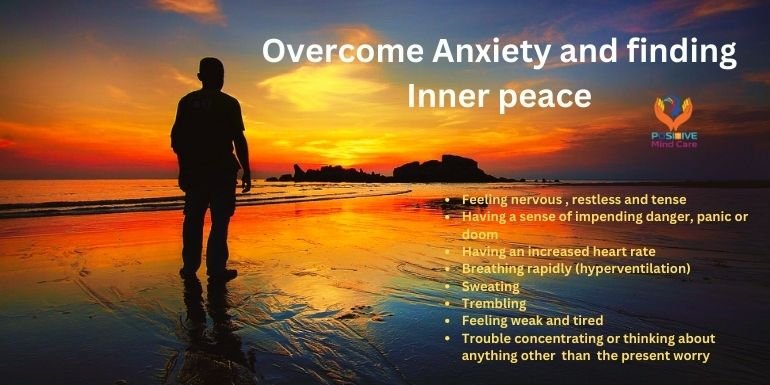Anxiety is an emotion characterized by feelings of tension, worried thoughts, and physical changes like increased blood pressure. It is a normal part of life, and everyone experiences it at some point. However, anxiety disorders involve more than temporary worry or fear and can interfere with daily activities.
One of the most common mood disorders is anxiety, which is characterized by feelings of nervousness or worry that distract you from everyday life and living. Anxiety often occurs before a big event or when participating in something with an outcome that is uncertain. Anxiety can develop after the death of a loved one, divorce and job loss, plus it can increase during stressful social situations, crowded areas and while working. There are a multitude of anxiety disorders that a person can experience, and approximately 40 million of the U.S. population (18%) have at least one of them. The most common forms of anxiety include generalized anxiety Disorder (GAD), panic disorder and phobia-related disorders. Generalized anxiety disorder experiences excessive anxiety symptoms nearly every day for at least six months, with worries including work, health and everyday social interactions. Their excessive symptoms impede their ability to function during normal events and experiences as they have higher feelings of restlessness, irritability, fatigue, difficulty concentrating, sleep problems and muscle tension. Panic disorder describes those who experience frequent panic attacks brought on by a stressful or fearful situation. During a panic attack, one might suffer from heart palpitations, trembling, shortness of breath, sweating and feeling out of control. Lastly, phobia-related disorders focus on an intense fear or aversion of an object or situation. Some phobias include a fear of heights, blood, needles or animals, while other phobias deal with social situations or separation anxiety. Agoraphobia is a common phobia-related disorder that involves having a fear of being in open or enclosed spaces, being outside or using public transportation. These phobias often push people to avoid their fears, experience excessive or irrational feelings towards said object or situation and feel intense anxiety when confronted with the thing that they fear. Each of these types of anxiety are debilitating in nature and can cause serious harm to a person’s social and familial relationships, their ability to work and even how they function day-to-day.
Symptoms of Anxiety
- Feeling nervous , restless and tense
- Having a sense of impending danger, panic or doom
- Having an increased heart rate
- Breathing rapidly (hyperventilation)
- Sweating
- Trembling
- Feeling weak and tired
- Trouble concentrating or thinking about anything other than the present worry
Anxiety Attacks
There are times anxiety can get severe and become an anxiety attack. An attack may initially feel manageable and gradually build up over a few hours.
Anxiety attacks may cause:
- Feelings of danger, panic, or dread
- Severe nervousness or restlessness
- Rapid heart rate
- Trembling
- Weakness
- Difficulty focusing
How to Overcome Anxiety?
Question your thought pattern
Unhelpful thoughts can take root in your mind and distort the severity of the situation. One way is to challenge your fears, ask if they’re true, and see where you can regain control.
Practice focused, deep breathing
Measured breathing practices may help you manage immediate feelings of anxiety. Try breathing in for 4 counts and breathing out for 4 counts for 5 minutes total. By evening out your breath, you’ll slow your heart rate, which should help calm you down.
The 4-7-8 technique is another popular breathing pattern for anxiety management
Use aromatherapy
Limited research suggests that aromatherapy can help reduce feelings of anxiety in some settings. Aromatherapy practitioners and supporters often report many anecdotal benefits of the practice.
Whether they’re in essential oil form, incense, or a candle, natural scents like lavender, chamomile, and sandalwood can be very soothing.
Exercise
Sometimes, the best way to stop anxious thoughts is to leave a situation and get moving. Focusing on your body and not your mind may help relieve your anxiety. Low impact exercises like walking, yoga, and tai-chi can often help people to reduce stress and manage anxiety symptoms.
Grounding techniques
Grounding techniques such as journaling and the 333 rule can often help to calm immediate feelings of anxiety.
The 333 rule involves naming three things you can see, three sounds you can hear, and interacting with three things you can touch. Writing down what’s making you anxious gets it out of your head and can make it less daunting. Reading your thoughts and feelings can help you take stock of your emotions in the immediate moment.
Identify and learn to manage your triggers
You can identify triggers on your own or with a therapist.
Sometimes they can be obvious, and other times, less so.
Common anxiety triggers include:
- Work, relationship, and other life stresses
- Withdrawal from drugs or certain medications
- Side effects of certain medications
- Exacerbation of past trauma
- Chronic pain
- Caffeine
- Smoking
Everyone has different triggers, and identifying them is one of the most important steps to coping with and managing anxiety attacks.
Socialize
Although everyone is different, and some people experience social anxiety, spending time with friends and family regularly may help you manage your anxiety.
Socialization can help relieve stress, encourage feelings of laughter and togetherness, and decrease loneliness.
Conclusion
Anxiety is a common emotion that can negatively affect our relationships, daily lives, and general well-being. However, there are several strategies to overcome anxiety and find inner peace.
One effective strategy is to learn to identify the anxiety as it is happening and label it. Once labeled, accept it and focus on a task that will focus or calm the mind. Another strategy is to analyze the fundamental origins and triggers of anxiety and fear. Gaining awareness of these triggers can help people gradually overcome fear and anxiety. Additionally, it is important to take care of physical health, exercise, and practice mindfulness techniques such as meditation and reflective journaling. Positive affirmations are also an effective way to speak positively and replace negative thoughts.



